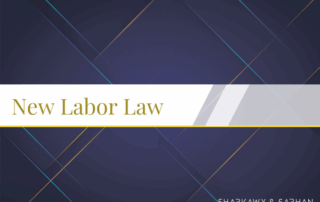30th of September, 2015
New Decree On Work Permits For Foreigners
By: Lamiaa Youssef and Ahmed Jamal
Keywords: Commercial, Infrastructure & Power
The Minister of Manpower has issued Decision 305/2015 that regulates permits of foreign employees. The new decision repeals the old decision 136/2003 and all its amendments. These are the significant amendments introduced by the new decision.
1) The decision increases the fees paid in exchange for the permit renewal after the third year, and for obtaining an exception from the 9:1 ratio. The minimum fee is EGP 5,000; it increases every year by EGP 1,000 and may reach a cap of EGP 15,000.
2) The decision widens the scope of the foreigners waived from obtaining a work permit in order to work in Egypt. New categories are:
2.1. members and experts working in scientific institutions and antiquities;
2.2. joint partners who invest not less than US$35,000 in joint-liability partnerships or partnerships limited by shares (This is not entirely new. It was applied by GAFI in practice, but it did not have an express source in legislation); and
2.3. foreigners who come to Egypt for short assignments that take few days only to execute. The decision provides that the foreigner will still pay the fees for the permit for each transaction into which he enters. (It is not clear how this will be implemented.)
3) The new decision liberates the internships of foreign students within an Egyptian institution. The new decision does not require the institution to notify the authorities with the duration of the internship or the data of the internees. In addition, the decision does not require anymore that “offering internships to foreign students” be added to the objectives mentioned in the institution’s documents.
4) The new decision does not require the applicant company to prove the absence of Egyptian candidates in order to hire a foreign employee. The decision only requires that the expert has at least three years of experience in her field.
A copy of the decision (Arabic) can be accessed here.
1) The decision increases the fees paid in exchange for the permit renewal after the third year, and for obtaining an exception from the 9:1 ratio. The minimum fee is EGP 5,000; it increases every year by EGP 1,000 and may reach a cap of EGP 15,000.
2) The decision widens the scope of the foreigners waived from obtaining a work permit in order to work in Egypt. New categories are:
2.1. members and experts working in scientific institutions and antiquities;
2.2. joint partners who invest not less than US$35,000 in joint-liability partnerships or partnerships limited by shares (This is not entirely new. It was applied by GAFI in practice, but it did not have an express source in legislation); and
2.3. foreigners who come to Egypt for short assignments that take few days only to execute. The decision provides that the foreigner will still pay the fees for the permit for each transaction into which he enters. (It is not clear how this will be implemented.)
3) The new decision liberates the internships of foreign students within an Egyptian institution. The new decision does not require the institution to notify the authorities with the duration of the internship or the data of the internees. In addition, the decision does not require anymore that “offering internships to foreign students” be added to the objectives mentioned in the institution’s documents.
4) The new decision does not require the applicant company to prove the absence of Egyptian candidates in order to hire a foreign employee. The decision only requires that the expert has at least three years of experience in her field.
A copy of the decision (Arabic) can be accessed here.

New Decree On Work Permits For Foreigners
30th of September, 2015
By: Lamiaa Youssef and Ahmed Jamal
Keywords: Commercial, Infrastructure & Power
The Minister of Manpower has issued Decision 305/2015 that regulates permits of foreign employees. The new decision repeals the old decision 136/2003 and all its amendments. These are the significant amendments introduced by the new decision.
1) The decision increases the fees paid in exchange for the permit renewal after the third year, and for obtaining an exception from the 9:1 ratio. The minimum fee is EGP 5,000; it increases every year by EGP 1,000 and may reach a cap of EGP 15,000.
2) The decision widens the scope of the foreigners waived from obtaining a work permit in order to work in Egypt. New categories are:
2.1. members and experts working in scientific institutions and antiquities;
2.2. joint partners who invest not less than US$35,000 in joint-liability partnerships or partnerships limited by shares (This is not entirely new. It was applied by GAFI in practice, but it did not have an express source in legislation); and
2.3. foreigners who come to Egypt for short assignments that take few days only to execute. The decision provides that the foreigner will still pay the fees for the permit for each transaction into which he enters. (It is not clear how this will be implemented.)
3) The new decision liberates the internships of foreign students within an Egyptian institution. The new decision does not require the institution to notify the authorities with the duration of the internship or the data of the internees. In addition, the decision does not require anymore that “offering internships to foreign students” be added to the objectives mentioned in the institution’s documents.
4) The new decision does not require the applicant company to prove the absence of Egyptian candidates in order to hire a foreign employee. The decision only requires that the expert has at least three years of experience in her field.
A copy of the decision (Arabic) can be accessed here.
1) The decision increases the fees paid in exchange for the permit renewal after the third year, and for obtaining an exception from the 9:1 ratio. The minimum fee is EGP 5,000; it increases every year by EGP 1,000 and may reach a cap of EGP 15,000.
2) The decision widens the scope of the foreigners waived from obtaining a work permit in order to work in Egypt. New categories are:
2.1. members and experts working in scientific institutions and antiquities;
2.2. joint partners who invest not less than US$35,000 in joint-liability partnerships or partnerships limited by shares (This is not entirely new. It was applied by GAFI in practice, but it did not have an express source in legislation); and
2.3. foreigners who come to Egypt for short assignments that take few days only to execute. The decision provides that the foreigner will still pay the fees for the permit for each transaction into which he enters. (It is not clear how this will be implemented.)
3) The new decision liberates the internships of foreign students within an Egyptian institution. The new decision does not require the institution to notify the authorities with the duration of the internship or the data of the internees. In addition, the decision does not require anymore that “offering internships to foreign students” be added to the objectives mentioned in the institution’s documents.
4) The new decision does not require the applicant company to prove the absence of Egyptian candidates in order to hire a foreign employee. The decision only requires that the expert has at least three years of experience in her field.
A copy of the decision (Arabic) can be accessed here.
Insights
Disclaimer
The information included in this publication/client alert is not legal advice or any other advice. Publications and client alerts on this site are current as of their date of publication and do not necessarily reflect the present law or regulations. Please feel free to contact us should you need any legal advice related to the publication/client alert. Sharkawy & Sarhan (the “Firm”) will not be held liable for any compensatory, special, direct, incidental, indirect, or consequential damages, exemplary damages or any damages whatsoever arising out of or in connection with the use of the data, information or material included in this publication/client alert. This publication/client alert may contain links to third-party websites that are not controlled by the Firm. These third-party links are made available to you as a convenience and you agree to use these links at your own risk. Please be aware that the Firm is not responsible for the content or services offered by and of third-party websites, links as included in the Newsletter nor are we responsible for the privacy policy or practices of third-party websites links included therein.
Authorization of Use
The data, information, and material included in this publication/client alert are solely owned by the Firm. All rights related are reserved under the laws of the Arab Republic of Egypt. No part of this publication/client alert can be redistributed, copied, or reproduced without the prior written consent of the Firm.










